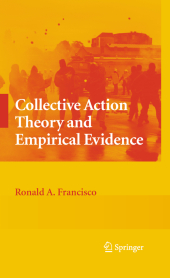 Neuerscheinungen 2014Stand: 2020-02-01 |
Schnellsuche
ISBN/Stichwort/Autor
|
Herderstraße 10
10625 Berlin
Tel.: 030 315 714 16
Fax 030 315 714 14
info@buchspektrum.de |

Ronald A. Francisco
Collective Action Theory and Empirical Evidence
2010. 2014. xiii, 116 S. 13 Tabellen. 235 mm
Verlag/Jahr: SPRINGER, BERLIN; SPRINGER NEW YORK; SPRINGER 2014
ISBN: 1-489-98329-5 (1489983295)
Neue ISBN: 978-1-489-98329-9 (9781489983299)
Preis und Lieferzeit: Bitte klicken
This book comprises empirical tests of the theoretical implications of collective action theory specifically with regard to mobilization. It is based on the author´s European Protest and Coercion Data, which won the Comparative Politics Section of American Political Science Association award for the best data set in 2007. The data is supplemented by historical investigations as well as other research. The volume is divided into six chapters. The introduction covers the theory of collective action in its many manifestations as well as the process of drawing out theoretical implications. The second chapter goes to the core of the mobilization issues, especially with regard to the role of leadership, which is inextricably linked to mobilization. The third chapter applies the concept of adaptation to the development of more productive tactics that promote mobilization in support of a public good and minimize the possibility of repression. In chapter four, five spatial hypotheses based on rationality and formal theories are developed and the role of time in protests is addressed. The fifth chapter focuses on the fundamental problems of terror with evidence from the Basque region of Spain and France from Ireland against the Provisional Irish Republican Army. The final chapter surveys the empirical evidence and summarizes the support of collective action theory. Testing collective action theory implications with empirical evidence will appeal to political scientists, sociologists, economists and researchers concerned with mobilization.
Testing Collective Action Theory.- Leadership and Mobilization.- Tactical Adaptation and Symbolic Protest.- Dimensions of Space and Time in Protest and Repression.- Terror.- Evidence for Collective Action Theory.


